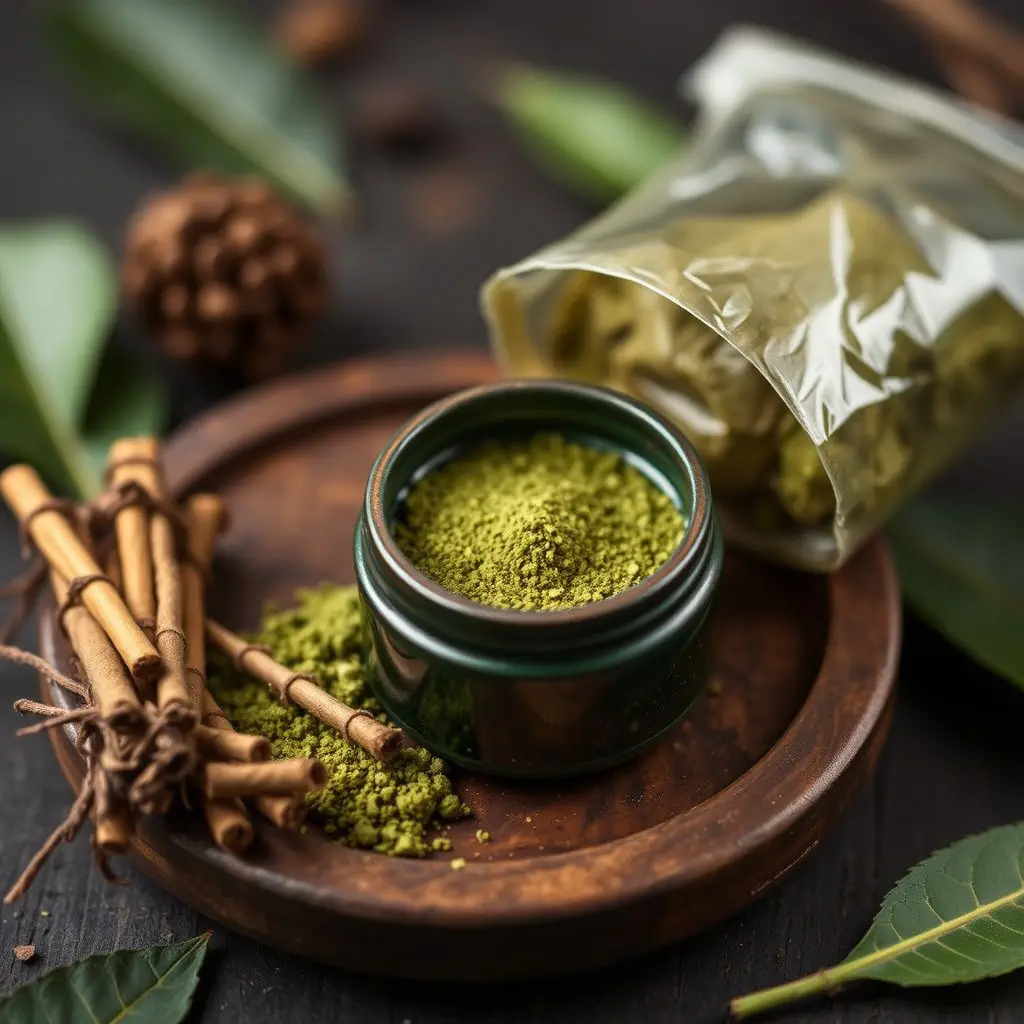Kratom, derived from the Southeast Asian tree Mitragyna speciosa, has garnered attention for its potential role in stress relief. Its leaves contain alkaloids like mitragynine and 7-hydroxymitragynine, which may interact with opioid receptors to influence mood and reduce anxiety. Users often report that kratom helps them achieve a state of calmness and improved mood, with certain strains such as Bali and Maeng Da being particularly noted for their stress-relieving effects. However, it's important to approach kratom use cautiously due to its potency and the risk of abuse, which has prompted regulatory attention. The efficacy of kratom for stress relief can vary, making it essential to consult with healthcare providers and adhere to recommended dosing guidelines. Research is ongoing to understand how kratom influences neurotransmitters like serotonin and norepinephrine, which are pivotal in mood regulation and the body's response to stress. Users should stay informed about the latest research and legal status of kratom, and integrate it into a holistic approach to stress management that includes lifestyle adjustments, therapeutic interventions, and other complementary methods for a balanced and effective stress relief with kratom experience.
Exploring the multifaceted benefits of natural compounds, this article sheds light on how Kratom can play a pivotal role in alleviating stress and anxiety. We delve into the science behind Kratom’s active alkaloids, particularly mitragynine, and its impact on emotional well-being. Furthermore, we offer insights into incorporating Kratom as part of a comprehensive strategy for stress relief with kratom, ensuring readers understand its place within holistic health practices. Join us as we navigate the potential of this plant to enhance mental clarity and serenity.
- Unraveling the Potential of Kratom for Stress Relief
- Understanding Kratom's Role in Anxiety Management: A Closer Look at Mitragynine Alkaloids
- Integrating Kratom into a Holistic Stress and Anxiety Reduction Plan
Unraveling the Potential of Kratom for Stress Relief

Kratom, a plant native to Southeast Asia, has garnered attention in natural health circles for its potential stress relief benefits. The active compounds found in kratom leaves, known as mitragynine and 7-hydroxymitragynine, may interact with the body’s opioid receptors, providing a modulating effect that can help alleviate feelings of anxiety and tension. Users often report that kratom helps them manage stress by promoting a sense of calm and well-being. The strain of kratom chosen can influence its efficacy for stress relief; some users prefer strains like Bali or Maeng Da for their anxiolytic properties, while others may opt for red vein varieties that are known for their relaxing effects. It’s important to approach the use of kratom with caution, as it can have potent effects and is subject to regulatory scrutiny due to its potential for abuse and dependency. Proper dosing and consultation with a healthcare provider are essential when considering kratom for stress relief to ensure safety and efficacy.
The mechanism by which kratom may offer stress relief is still under scientific investigation, as research continues to uncover the complex interactions between kratom’s alkaloids and human physiology. Preliminary studies suggest that kratom could modulate neurotransmitters like serotonin and norepinephrine, which play a role in mood regulation and stress response. While anecdotal evidence is plentiful, scientific understanding and regulatory oversight are still evolving. As such, those interested in using kratom for stress relief should stay informed about the latest research and legal considerations. It’s also crucial to consider kratom as part of a holistic approach to managing stress, which may include lifestyle changes, therapy, and other complementary practices.
Understanding Kratom's Role in Anxiety Management: A Closer Look at Mitragynine Alkaloids

Kratom, a tropical deciduous tree native to Southeast Asia, has garnered attention in natural health circles for its potential role in stress relief and anxiety management. The plant’s leaves contain a variety of alkaloids, with mitragynine and 7-hydroxymitragynine being the most prominent. These compounds are believed to interact with the brain’s receptors in ways that may influence mood and emotional well-being. Mitragynine, in particular, has been studied for its analgesic and anxiolytic properties, which could explain its use by individuals seeking stress relief with kratom.
Research suggests that the alkaloids found in kratom may modulate neurotransmitter systems associated with mood regulation, such as the serotonergic and dopaminergic pathways. This modulation could potentially lead to a calming effect, helping to alleviate symptoms of anxiety and stress. While the scientific community continues to explore the mechanisms behind kratom’s effects, anecdotal evidence from users indicates that kratom may offer a sense of tranquility and mental clarity. It is important for individuals considering kratom for stress relief or anxiety management to approach its use with caution and to consult healthcare professionals, especially given the regulatory status of kratom in various countries. Understanding the nuanced effects of kratom’s alkaloids remains a key area of research, with ongoing studies aiming to elucidate their potential role in supporting mental health.
Integrating Kratom into a Holistic Stress and Anxiety Reduction Plan

Incorporating Kratom into a comprehensive holistic plan for stress and anxiety relief can be a nuanced approach, tailored to individual needs and sensitivities. Kratom, derived from the leaves of Mitragyna speciosa, has been traditionally used in Southeast Asia for its potential wellness benefits, including stress relief with kratom. For those seeking natural alternatives to pharmaceuticals, Kratom may offer a viable option due to its alkaloid profile, which includes mitragynine and 7-hydroxymitragynine. These compounds are believed to interact with the brain’s opioid receptors, which can lead to a modulation of mood and pain perception. When integrating Kratom into one’s routine, it is essential to approach it with caution, adhering to appropriate dosages and considering the legality and purity of the product. Users should consult with healthcare professionals to ensure safe use and compatibility with any other treatments or medications.
A well-rounded holistic plan complementing Kratom use might include lifestyle adjustments such as regular exercise, a balanced diet, adequate sleep, mindfulness practices, and possibly therapeutic modalities like cognitive-behavioral therapy (CBT). This multifaceted approach not only targets the physiological aspects of stress and anxiety but also addresses their psychological and emotional underpinnings. By combining Kratom with these complementary strategies, individuals may experience a synergistic effect that promotes long-term stress relief with kratom and improved mental well-being. It is crucial to maintain open communication with healthcare providers throughout this process, as individual responses to Kratom can vary greatly, and professional guidance is key to personalizing an effective treatment plan for managing stress and anxiety levels.
In conclusion, the potential of kratom as a natural approach for stress relief and anxiety management is multifaceted. The mitragynine alkaloids present in kratom leaves have been shown to exert beneficial effects on mood and anxiety levels. By integrating kratom into a comprehensive holistic plan, individuals may find significant improvement in their stress and anxiety symptoms. It’s clear that further research is warranted to fully understand the mechanisms behind kratom’s impact on mental health. However, for those seeking alternative remedies for stress relief with kratom, it’s encouraging to note the positive outcomes reported by many users. As with any supplement or treatment, consultation with healthcare professionals is essential to ensure safe and effective use of kratom as part of an overall wellness strategy.






